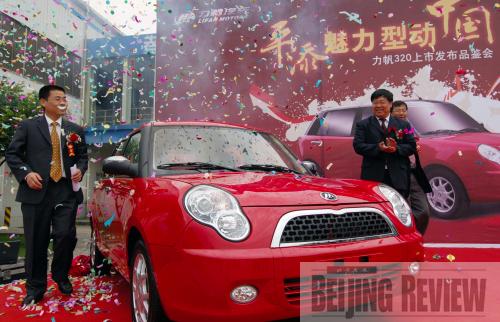|
 |
|
ADORABLE AND AFFORDABLE: The Lifan 320 launched in May is popular among young car buyers in part because of its close resemblance to BMW's Mini Cooper (LIU CHAN) |
Add two more wheels to a motorcycle and you will have a car. That was what automakers including BMW AG and Honda Motor Co. Ltd. did to continue to succeed in the era of auto consumption.
Four years ago, China's privately owned motorcycle producer Chongqing Lifan Industry (Group) Co. Ltd. followed in their footsteps and started producing compact cars.
As a counter-crisis effort, the now third largest sedan exporter in China officially introduced its new mini model, Lifan 320, on May 7 to enrich its product line. During its six-city promotion in May, the four-door clone of BMW Group's Mini Cooper priced at 50,000 yuan ($7,153) received more than 1,000 orders.
The company received overseas orders totaling $170 million at the Shanghai Auto Show in April, fueled mainly by demand for its 320 model, said Liao Xionghui, General Manager of Lifan Motor Sales.
"Sales of mini cars will become a new growth point for us," he told Beijing Review. He added although the financial crisis caused the company's exports to drop by 40 percent year on year in the first quarter, booming domestic sales have offset most of the overseas losses.
"The most important thing for China's independent automakers now is to survive," Lifan's President Yin Mingshan said.
In order to do that, Lifan has invited two strategic investors since last year and wants more. Meanwhile, Yin is adhering to a policy of "less is better." The company has slowed down its launch of new cars while ensuring that each model becomes popular and sells well.
From two wheels to four
Yin made his money by selling books in the 1980s and invested 200,000 yuan ($29,283) in Lifan in 1992 to make motorcycles. In less than a decade, he turned its motorcycle repair workshop into a motorcycle kingdom.
Lifan topped its domestic competitors in terms of motorcycle engine sales, ranking third in the country in terms of vehicle sales in 2005 and was China's largest motorcycle exporter that year.
But prior to that, competitive prices have already driven down the company's profit margins. In Southeast Asia, where Lifan has hoped for increased sales, each motorcycle generated only 30-40 yuan ($4.4-4.8) in profit in 2005.
Lifan had attempted diversity and invested widely in alcohol, cigarette and garment manufacturing and the real estate sector from 2001 to 2004. However, most of these attempts failed until Yin found a four-wheel solution in 2005.
Yin made another bold decision at the age of 65. Unlike its previous investments in irrelevant industries, the company aimed to upgrade its vehicle production and focus on automobile manufacturing now because "the golden age of motorcycle makers passed," he said.
Experiences from developed countries such as the United States and Japan indicate that societies enter an era of car consumption when their annual per-capita GDP exceeds $1,200. China's per-capita GDP exceeded $1,000 in 2003 and reached $3,300 last year.
"It's a reliable and effective expansion, because it's easy for Lifan to transfer its experience and technologies in the motorcycle segment to the passenger car segment," Yin said.
Today Lifan has sedan, truck and passenger car production lines. During the past four years, it has introduced its 520, 520i and 620 models and opened production plants in Viet Nam, Iran, Ethiopia and Russia.
Counter-crisis solutions
But Lifan failed to meet its sales goal last year and had to adjust its expectation for 2009 to 60,000 vehicles, because of its crisis-affected overseas sales.
The company's sedan exports alone plummeted 80 percent in the first quarter this year, according to Liao.
Cheered by the Chinese Government's policies to encourage the purchase of small-engine vehicles, Lifan now depends on mini car sales and in May launched the Lifan 320 mini model with 1.1-liter engine. The company's mini car plant in Chongqing is almost completed. In September, Lifan plans to introduce a minibus for 40,000 yuan ($5,857), Liao said.
In addition, the government's policy of subsidizing auto purchases in rural areas will also help the company. Lifan will now take full advantage of its extensive motorcycle sales networks in rural areas to sell its car products in small county seats.
Besides, Lifan is now in better cash position after two rounds of strategic investments. The company sold a 13.5-percent stake for $90 million to American International Group last July before the U.S. insurance giant was later bailed out by the government on credit default swaps. Earlier this year, Lifan announced it secured another investment worth 150 million yuan ($22 million) from a Shanghai-based investment company.
"The financial crisis forced us to reconsider our quick expansion," Yin said. "I admire Honda because the company has limited its number of models and has had a high profit rate for a single car model. That's the example for Lifan."
Lifan will launch at most two models a year in the future and focus on the high quality and profitability of each model, Yin said. | 